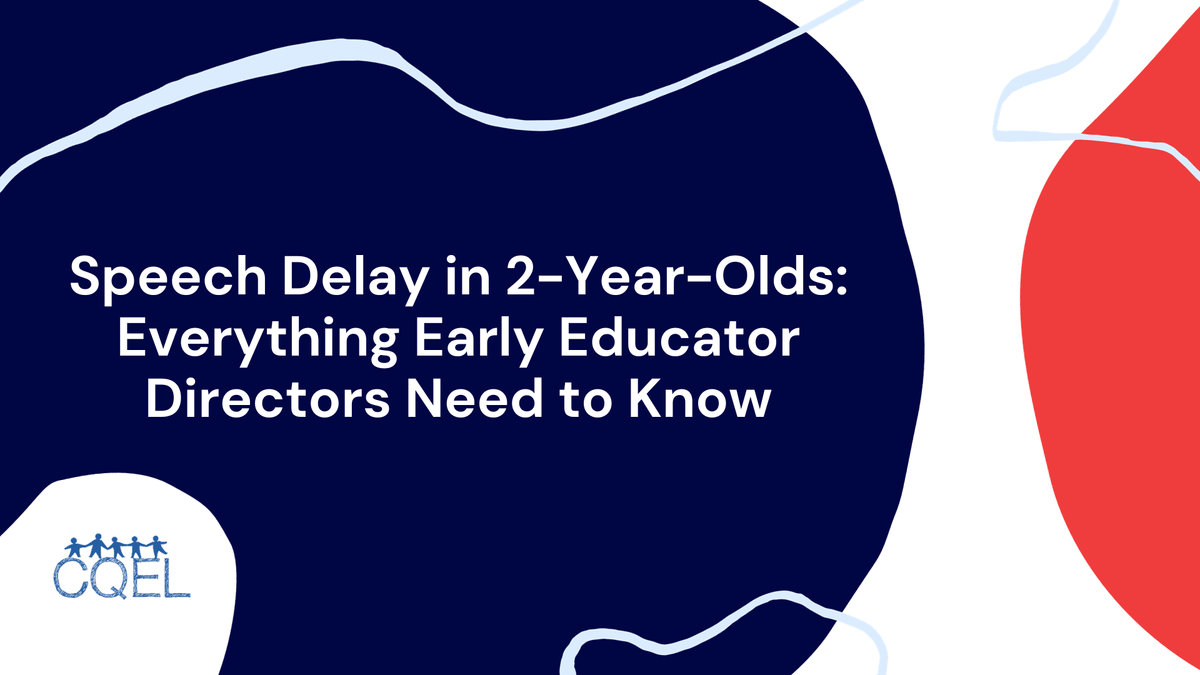Speech Delay in 2-Year-Olds: Everything Early Educator Directors Need to Know
Speech delay is a common developmental concern in early childhood. It is estimated that 3-5% of toddlers experience a speech delay.

Speech delay is a common developmental concern in early childhood. It is estimated that 3-5% of toddlers experience a speech delay. A speech delay occurs when a child's speech development is slower than expected for their age. This can be caused by a variety of factors, including hearing loss, intellectual disabilities, and autism spectrum disorder. However, in most cases, the cause of a speech delay is unknown.
Identifying a Speech Delay in 2-Year-Olds
Early educator directors can play an important role in identifying speech delays in 2-year-olds. There are a number of red flags that can indicate a speech delay, including:
- A limited number of words (fewer than 50 words)
- Difficulty understanding simple words and phrases
- Difficulty imitating words and sounds
- Using mostly gestures to communicate
- Unclear speech that is difficult to understand
If you are concerned that a 2-year-old in your care may have a speech delay, it is important to talk to their parents and to refer them to a speech-language pathologist for a comprehensive evaluation.
Supporting Speech Development in 2-Year-Olds
There are a number of things that early educator directors can do to support speech development in 2-year-olds, including:
- Provide a language-rich environment. This means talking to children throughout the day, narrating your actions, singing songs, and reading stories.
- Model clear and correct speech. Be mindful of your own speech, and make sure that you are speaking slowly and clearly.
- Give children plenty of opportunities to practice speaking. Engage children in conversation and give them time to respond to your questions.
- Don't correct children's grammar or pronunciation too often. Instead, focus on providing them with opportunities to practice speaking.
- Create a supportive and encouraging environment. Make children feel comfortable speaking and taking risks.
Working with Parents of 2-Year-Olds with Speech Delays
It is important to work closely with the parents of 2-year-olds with speech delays. You can support parents by:
- Providing them with information about speech delays and how to support their child's speech development at home.
- Sharing your observations of their child's speech development.
- Collaborating with them on strategies to support their child's speech development at both home and school.
Speech delays are a common developmental concern in early childhood. However, with early identification and intervention, most children can overcome a speech delay. Early educator directors play an important role in identifying speech delays in 2-year-olds and in supporting their speech development.
Relationship Between Speech Delays and Early Literacy Development
Speech delays can have a significant impact on early literacy development. Children who have difficulty communicating are less likely to be able to understand and process language, which can make it difficult for them to learn to read and write.
One of the most important skills for early literacy development is phonological awareness. Phonological awareness is the ability to hear and manipulate the individual sounds in words. Children with speech delays often have difficulty with phonological awareness, which can make it difficult for them to learn to read and spell.
In addition, children with speech delays may also have difficulty with other early literacy skills, such as vocabulary development and grammar comprehension. This is because they may have less exposure to language and less opportunity to practice using language in different contexts.
Language-rich environment
Early intervention is essential for children with speech delays. Early intervention can help children to catch up to their peers in terms of speech and language development. It can also help to reduce the risk of long-term problems with reading and writing.
Early intervention services for children with speech delays typically include speech-language therapy. Speech-language therapists can help children to improve their speech production, language comprehension, and communication skills. They can also work with parents and teachers to provide strategies for supporting children's speech and language development at home and school.
Tips for Early Educator Directors on How to Create a Language-rich Environment in the Classroom
Early educator directors can create a language-rich environment in the classroom by:
- Talking to children throughout the day, narrating your actions, and singing songs and reading stories.
- Providing children with opportunities to engage in conversation with each other and with adults.
- Using a variety of language activities, such as games, songs, and fingerplays.
- Creating a print-rich environment with books, magazines, and other written materials.
- Encouraging children to ask questions and to express their ideas.
- Being patient and supportive when children make mistakes.
Encouraging Early Educator Directors to Collaborate with Parents of Children with Speech Delays
It is important for early educator directors to collaborate with the parents of children with speech delays. This collaboration can help to ensure that children are receiving consistent support for their speech and language development at both home and school.
Early educator directors can collaborate with parents by:
- Sharing information about the child's speech and language development.
- Providing parents with strategies for supporting their child's speech and language development at home.
- Working with parents to develop a plan for supporting the child's speech and language development at school.
Links to Additional Resources for Early Educator Directors and Parents
- American Speech-Language-Hearing Association: Speech Delays in Toddlers: www.asha.org
- National Institute on Deafness and Other Communication Disorders: Speech Delay in Children: www.nidcd.nih.gov
- National Literacy Trust Early Literacy Tips for Parents: literacytrust.org.uk
